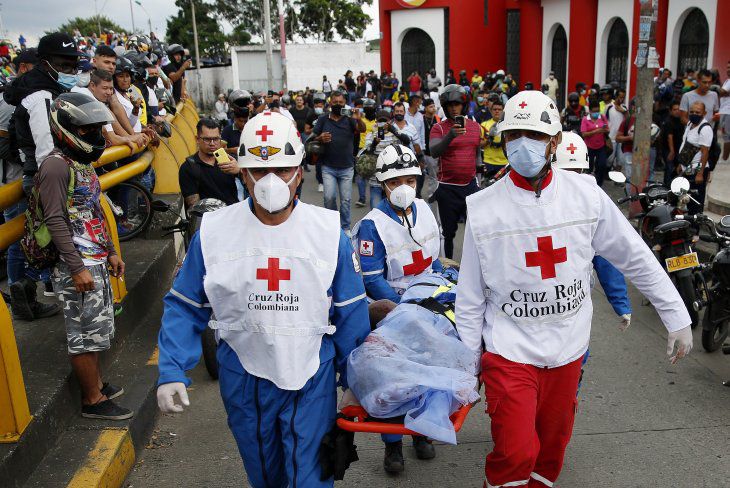RIO DE JANEIRO, BRAZIL – In the Colombian city of Cali, where yesterday there were heavy clashes between protesters and the security forces and the irruption of alleged armed civilians in some neighborhoods, 13 homicides were reported, according to local authorities and the police on Saturday, May 29.
“We still cannot specify if all the deaths we have had on May 28 are linked and integrally associated to the process of the protests,” explained the mayor of Cali, Jorge Ivan Ospina, who alluded to the fact that the Prosecutor’s Office reported 13 homicides yesterday and is the one who must investigate them and give answers.

“However -he added- “there is no doubt that a significant number of the deaths we have had on May 28 have been associated to events of citizen mobilization.”
For its part, the police report 10 homicides, only relate 3 to the protests, and the rest “would be related to the settling of scores between criminal structures, intolerance, and hired killings.”
The mayor also denounced the acts of “pure and irrational vandalism” against private and public properties.
The Director of Criminal Investigation and Interpol (DIJIN), General Fernando Murillo, explained today that “there was a special situation where some people in civilian clothes used firearms indiscriminately against other people.”
The events took place mainly in Ciudad Jardín, a residential area of the city, close to the road that connects with Jamundí where there have been blockades.
In this area, alleged civilians carrying weapons burst in and shot at the hooded youths on the “front line”, the front part of the protests protected with shields and maintaining the blockades.
“Unfortunately, in this place and at this very moment, there were several law enforcement officials who omitted their duty to prevent these events from occurring and to capture these people,” Murillo added.
The first death occurred in a blockade on the road connecting Cali and La Candelaria, where inhabitants dissatisfied with the blockades tried to lift the one at the exit of Poblado Campestre and ended up killing a 22-year-old young man who was part of the “front line”.
On Friday morning, an official of the Technical Investigation Corps (CTI) of the Prosecutor’s Office, while passing through another blockade in the center of the city, in the sector of La Luna, killed two people, after which he was grabbed by those attacked and lynched.
And also, at night in the Meléndez neighborhood, there were several shootings, and the murder was reported of a 22-year-old young man, Sebastián Jacanamejoy, an Inga indigenous community member and student at the Universidad del Valle.
MILITARIZATION
Cali awoke this Saturday with military patrolling the streets and a 750-strong police force after President Iván Duque ordered: “the largest deployment” of military force during a visit to the city.
“As of tonight begins the maximum deployment of military assistance to the National Police in the city of Cali and the department of Valle (del Cauca),” said Duque, who again relied on the figure of “military assistance” that he has already used on other occasions these past four weeks.
Calm has apparently returned to the city, which has been the city with the most mobilizations, blockades, and police brutality since the beginning of the protests.
The protests began on April 28 with a large national strike that brought tens of thousands of people in all the country’s cities to the streets to show their rejection of the processing of the now-defunct tax reform. But social mobilizations have spread since then, revealing a gamut of demands ranging from an end to police brutality to a minimum income or better public services.
According to the NGO Temblores and the Instituto de Estudios para el Desarrollo y la Paz (Indepaz), there have been 60 deaths in the protests, 43 of which are attributed to the security forces. The Attorney General’s Office counts 43 deaths, although only “17 of them have a direct link to the protests”.
In addition, the authorities are still searching for 123 people reported as missing in the protests. Civil organization Coordination Colombia Europe United States ensures that 327 have yet to be found.

